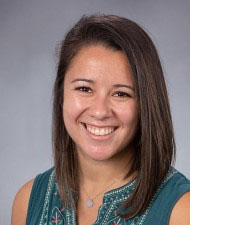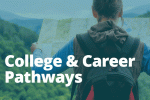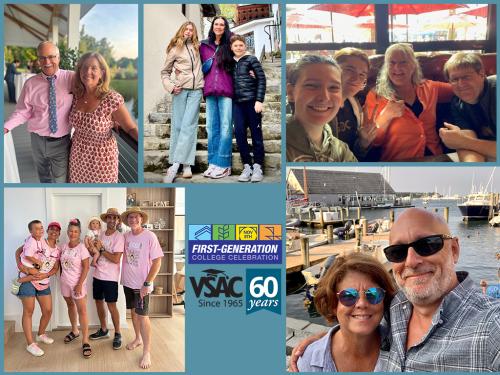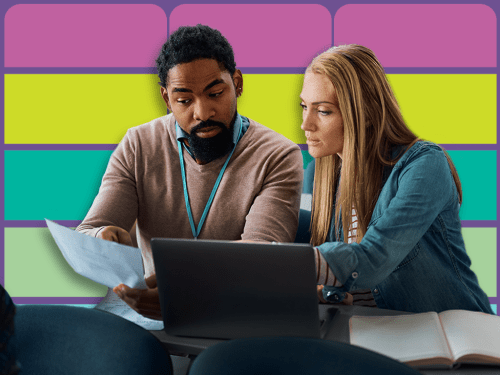VSAC will be closed Monday, February 16, 2026 in observance of Presidents’ Day.
VSAC alumna Johanna Krushat guides kids through their emotions and their futures
 From a young age, Johanna Krushat had an inkling that she wanted to work with kids, but she wasn’t sure about the “how” or the “where.” Her Vermont Student Assistance Corp. (VSAC) counselor helped her narrow that down, and Johanna decided she wanted to be an elementary-school counselor. After leaving Vermont for her education, she knew she wanted to return to the state she had called home since she was 8 years old. Now, as the school counselor for Albany Elementary School in the Northeast Kingdom, Johanna has been guiding her students through a global pandemic and connecting them with the same college and career guidance resources that helped her find her own direction.
From a young age, Johanna Krushat had an inkling that she wanted to work with kids, but she wasn’t sure about the “how” or the “where.” Her Vermont Student Assistance Corp. (VSAC) counselor helped her narrow that down, and Johanna decided she wanted to be an elementary-school counselor. After leaving Vermont for her education, she knew she wanted to return to the state she had called home since she was 8 years old. Now, as the school counselor for Albany Elementary School in the Northeast Kingdom, Johanna has been guiding her students through a global pandemic and connecting them with the same college and career guidance resources that helped her find her own direction.
“I was involved in mentoring programs in high school, and I really enjoyed that one-on-one interaction with young kids,” Johanna recalls. “One day, the coordinator of the afterschool program where I was mentoring said to me: ‘If this one particular child tells you anything really personal that’s kind of ‘out there,’ please let me know.’ And I remember thinking, I can’t imagine being that person that gets that information — and then being the person who gets to help that child get the support they need,” she says.
After that first clue that counseling might be her path, Johanna talked it through with Holly Hammond, her outreach counselor in the VSAC program she’d participated in since the seventh grade. She met with Holly once a month throughout her middle and high school years at Green Mountain Union High School in Proctorsville, where Johanna grew up.
“I always felt comfortable talking with Holly,” Johanna recalls. “We talked about what I wanted to achieve in life, and she helped me pinpoint what I wanted to do. She led me to the career that I’m currently in, and I think she really led me in a good direction.”
VSAC continued to be a valuable source of support for Johanna and her parents as she began her college search process a few years later. As the first in her family to go to college, Johanna didn’t have a frame of reference, and her parents were understandably a little overwhelmed by the process. “I was the first to go through all of that paperwork, and my dad was very stressed. He didn’t want to mess up,” Johanna laughs. “It was also hard to understand the financial aspects of college and what that looked like. Holly was always really good about asking, ‘what do you need?’ — and if I didn’t need anything, it was just, ‘okay, I’m here.’”
From Long Island to Proctorsville
Johanna was born in Long Island, New York, and spent her early childhood there until 9/11. After that day, her father decided to move the family to southern Vermont, where they had taken a vacation a year or so before. They settled quickly into their new village of Proctorsville, just five minutes from Okemo Mountain.
“We grew up in the best conditions any kid could grow up in,” Johanna recalls. “We lived at the end of a dead-end road, and we felt very safe. My younger brother, younger sister, and I could walk to school, and we were really close with our neighbors. I used to sell pies by the side of the road with my best friend and her parents. It was a community where, even if you moved in, you felt at home.”
Johanna also speaks fondly of her own elementary-school experience.
“My teachers made a real impact on me and taught me some of the most valuable lessons I learned in school. I was fortunate to learn from my parents, teachers, and neighbors, then go and spread my wings, and then come back to Vermont. My purpose was to get my education and then come back home.”
Johanna studied psychology at Elmira College in New York. After graduating in 2014, she went right on to Plymouth State University in New Hampshire, where she earned her master’s degree in education in 2017. From there, she jumped into the job search and soon found a position with the Orleans Central Supervisory Union.
Teaching the social-emotional lessons
At first, she was covering two schools — Brownington Central School and Albany Community School — which meant she was responsible for 200 students, floating back and forth between two buildings. While the workload meant she was stretched pretty thin, she said she loved the atmosphere and the area’s amazing outdoor education program. Fortunately, her role was revised shortly thereafter, and she is now the dedicated counselor for Albany Community School, a K-through-8 building with just over 80 students. She teaches social-emotional learning in the classroom and meets one-on-one with students as needed.
“I specifically chose the elementary level over high school, because I want to work with students while they’re young,” Johanna says. “I can help them learn those important social-emotional lessons early on, so they’re better prepared when they get into middle and high school.”
“I tell kids all the time, you may not have control over what’s happening in the world or what’s happening in the classroom, but you have control over how you react and how you feel. No one can take that from you. It doesn’t happen overnight — it takes practice — but that’s what I’m here for.”
That lesson may be the most important one that students take away from their pandemic academic years, with the extreme stresses kids have faced since early 2020. Johanna describes the challenges of the last two years as “a jumble of knots. When we pull one knot to loosen it, another one is created,” she says.
Pandemic tangles
While we’ve all adapted to mask-wearing as a necessary inconvenience, one result for young children, she says, is a difficulty learning to identify others’ emotional responses. “When we can’t see people’s full facial expressions, someone’s ‘concentration face’ may look like their ‘anger face,’” Johanna explains, and misunderstandings can often ensue.
The transition to virtual learning allowed school to continue, but for many middle-school students, the Zoom environment introduced a new source of anxiety: showing their faces all day to their peers. In a traditional classroom setting, students all face the same direction. But appearing in a Zoom collage can feel much more public, almost akin to standing up in front of the class.
And while Johanna continued to set up one-on-one appointments with students who needed to talk, those virtual sessions weren’t quite as private as meeting with her in her office. “Now you have siblings and parents in the background. Some kids wouldn’t say anything at all because it didn’t feel confidential,” she says.
Making career connections
This year, Johanna is glad to be back in-person, where, she says, “students get the best learning experience.” It also affords her more opportunities to talk with her students about their own future aspirations. Johanna often teams up with the area’s VSAC counselor, Matt Mitchell, who comes into her middle school classrooms to do games and presentations on career exploration. “He’s so engaging with the kids. Matt does ‘College and Career Jeopardy,’ which the kids love,” she says.
“I love helping to make these connections. It’s nice to start the career conversation early and make Matt a familiar face,” says Johanna.
“I try to emphasize the importance of VSAC to my students. There’s a lot of fear for these kids, because many of them know their parents can’t afford college tuition. I tell them that a college education helps you earn more money in the long run and helps you get into a career you love.”
“I’m always saying to them, ‘You guys have unlimited potential. You just need some patience, some coaching, and some support.’ And there is support available. They just need to know where to find it.”
Need help with pursuing your career goals and education? VSAC is here to help you. For information on college and career planning and help with financial aid, go to www.vsac.org/FAFSAfirst and check out our online workshops and events. . You can also give us a call at 800-642-3177, 8 a.m. to 4:30 p.m., Monday through Friday, or e-mail us at info@vsac.org.





